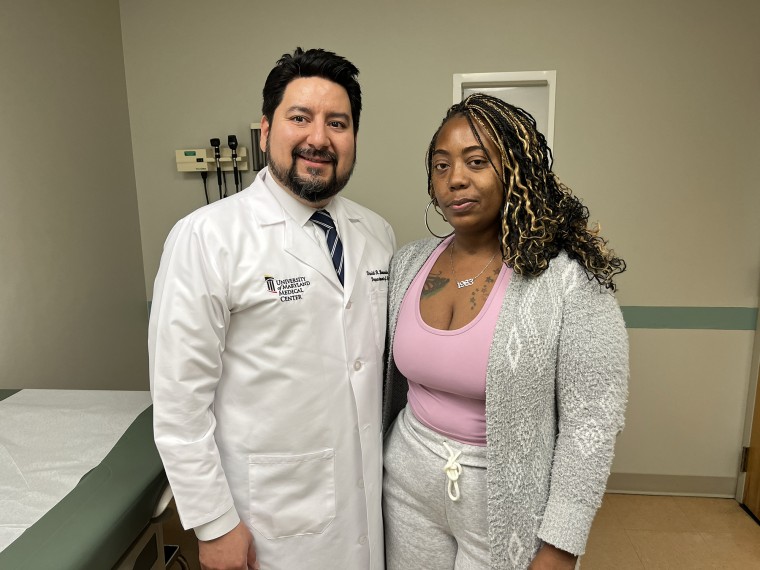Latoya McDonald's symptoms started relatively small.
McDonald, 40, of Baltimore, Maryland, noticed that she was forgetting things, like picking up her daughter from school, and she started falling asleep behind the wheel of her car.
A week or two later, her symptoms became more severe.
"I started seeing things that weren't there. I was hearing things that weren't there," McDonald, a mother of two and grandmother who works at Walmart, tells TODAY.com.
One night, she recalls completely being in "a whole other world... I was in the corner of my room talking to the wall," she says. "I really can't remember what I was there, but my daughter was pretty scared."
McDonald was taken to the psychiatric ward of a local hospital and ultimately sent home. "They wanted to write this off as bipolar or schizophrenia," McDonald recalls.
But her symptoms continued — and hit a breaking point one day in the summer of 2018 when McDonald got in her car and went downtown for what she thought was a job interview. "I wasn't going to a job interview because there was no job," she says. "But there was something in my mind telling me that I had a job interview."
Once she was parked and wandering around, she became confused. McDonald called her boyfriend for help because she couldn't remember what she was doing there or where her car had gone. A stranger at a gas station drove her to meet her boyfriend and, at that point, the couple knew something very serious was happening to her.
Imaging tests as well as blood tests and a spinal tap confirmed that something else was going on: McDonald didn't have a mental health condition — she had developed a rare, severe brain disease called autoimmune encephalitis.

What is autoimmune encephalitis?
The condition, which features prominently in the book "Brain on Fire: My Month of Madness" and the Netflix film of the same name, occurs when the immune system gets confused and begins attacking the body's own brain tissues.
In McDonald's case, undiagnosed ovarian tumors set off her immune system's alarm bells and caused her body to produce antibodies in response to proteins present in the tumors, Dr. David Benavides, a neurologist at the University of Maryland Medical Center who treated McDonald, tells TODAY.com.
But those proteins aren't just found in the tumors, he says, they're also found in the brain. So when the antibodies spread to her brain, they attacked those normal brain proteins, Benavides explains.
This causes encephalitis, a type of brain inflammation that leads to symptoms like those McDonald experienced, such as hallucinations, seizures and confusion. At its most severe, autoimmune encephalitis can be fatal, Benavides says.
Autoimmune encephalitis is actually a group of conditions, which are differentiated based on the type of antibodies the body produces or the location of inflammation in the brain.
The most common version of the condition (and the one McDonald developed) is one in which the body develops antibodies that target NMDA receptors. These receptors are sometimes found in tumors and are also present normally in the brain.
One type of ovarian tumor — a teratoma cyst — is particularly likely to cause anti-NMDA autoimmune encephalitis because these tumors contain tissue that resembles that of other organ systems in the body, including the brain, Benavides explains.
"Teratomas are benign. They tend to be very slow growing and to not be associated with symptoms," he adds, which means they can be easy to miss.
So, once doctors saw she had anti-NMDA antibodies and determined that McDonald’s symptoms were actually due to autoimmune encephalitis, the first step was to remove the tumors at the root of the condition.

Surgery was just the beginning of McDonald's recovery
While surgery was a necessary first step, which occurred in late August 2018, it was just the beginning of a long road of treatment for McDonald, Benavides explains.
Her encephalitis caused seizures, which needed to be stabilized, as well as her variable blood pressure and heart rate. "Once all of these things were optimized, we had to put her on a breathing tube because she was very sick in an intensive care unit," Benavides says.
She also received a type of chemotherapy to stabilize her body's immune response and help prevent her symptoms from returning.
However, McDonald remembers very little of her experience firsthand, which is common among people who've had autoimmune encephalitis, Benavides says.
Once she was able, she entered inpatient rehabilitation until November.
“Waking up, knowing what you’ve been through for almost four months, was pretty wild to me... I was like, Wow, it’s winter out? I missed the summer?” she recalls. “I had to learn how to walk, talk, eat — everything.”
While most people who get treatment for the condition make some type of recovery, “most patients do not make it back to their previous baseline,” Benavides says, and many are unable to return to work or school or regain independence. In some cases, the condition can relapse.
McDonald's recovery, however, has been "excellent," Benavides says. From having such a "severe acute onset" of the disease, "we're really happy with the recovery that she's made over these years," he adds.
With the help of therapy, McDonald has been able to process her experience and what it means to continue to live with the aftereffects. “At one time I used to think, I’m never going to be me again,” she says. “I couldn’t imagine being independent.” And as someone who has to go to sleep early and doesn’t drink due to medication, “It’s lonely here sometimes,” she adds.
She credits the support system of “people who are strong enough to be there for you” for getting her through the ordeal. "I'm just so glad that I had people to advocate and fight for me to figure out what really was the issue here," McDonald says, noting that it was her grandmother who pushed doctors to take another look at her case in the psychiatric ward.
Today, McDonald is doing well. She's been off chemotherapy for about a year and just enrolled in real estate school. But she still deals with short-term memory issues and takes mood-stabilizing medications, which Benavides says is common for people recovering from this condition.
Looking back, McDonald wishes she had gotten the noticeable lump in her pelvis, which turned out to be an ovarian tumor, checked out sooner. "I tell women all the time to stay on top of their yearly physicals. Don't ignore anything, because that's what I did," she says.
And when you run into challenges in the medical system, "be persistent," she says. "Ask questions. And if that doctor isn't giving you what you want to hear, go to the next."